
I have hundreds of posts in draft form. I am struggling to catch up. Injuries done to me when I was being raped (often) as a child causes me difficulty typing and posting. Unknowingly bathing in Encana/Ovintiv’s life-threatening frac water and breathing the company’s toxic pollution for years compounded the harms.
This SCOTUS ruling is from 2022, with a few comments about the 2023 judicial mess at Canada’s Supreme Court.
***
Lawprofblawg@lawprofblawg “Living legend.” Law Professor. June 30, 2022:
BREAKING: In 6-3 ruling, SCOTUS asserts that only corporations have the right to abortion, if done properly through child health and development issues arising from air pollution.
***
West Virginia v. EPA decision: https://supremecourt.gov/opinions/21pdf
SCOTUSblog@SCOTUSblog:
The Supreme Court sharply curtails the authority of the EPA to regulate greenhouse-gas emissions that cause climate change. In a 6-3 ruling, the court sides with conservative states and fossil-fuel companies in adopting a narrow reading of the Clean Air Act.
US Supreme Court rules Environmental Protection Agency’s powers do not extend to protecting environment Satire but Trumpian Reality.
… Writing for the majority, Chief Justice Roberts argued that the Clean Air Act, the federal law which authorises the EPA to establish standards to protect public health and welfare, did not grant the EPA authority to establish standards to protect welfare and public health.
… In Washington Republican groups celebrated the SCOTUS decision to return the ability to dictate desperately needed climate policies to Congress, a group where half refute climate change exists and the other half don’t want to make waves by believing in anything.
“Finally, the power to decide how to deal with climate change is back in the hands of the American people!” said Patrick Morrissey, the attorney general of West Virginia, the plaintiff in the case. ”Technically, highly paid lobbyists and their billionaire bosses are also American people.” …
***
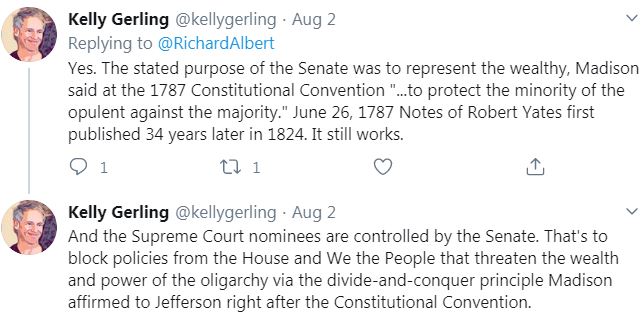
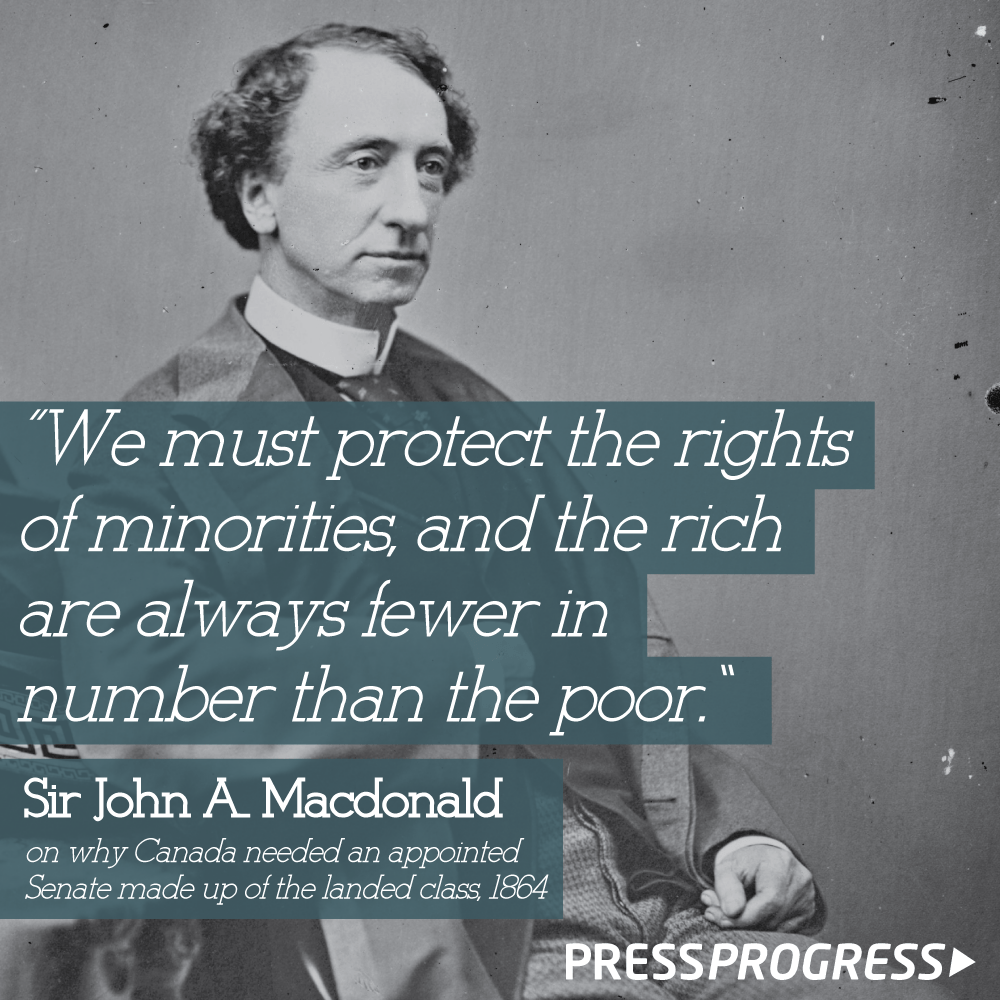
***
The US supreme court has sided with Republican-led states to in effect hobble the federal government’s ability to tackle the climate crisis, in a ruling that will have profound implications for the government’s overall regulatory power.
In a 6-3 decision that will seriously hinder America’s ability to stave off disastrous global heating, the supreme court, which became dominated by rightwing justices under the Trump administration, has opted to support a case brought by West Virginia that demands the US Environmental Protection Agency (EPA) be limited in how it regulates planet-heating gases from the energy sector.
… Not only was this case about a regulation that does not exist, that never took effect, and which would have imposed obligations on the energy sector that it would have met regardless. It also involves two legal doctrines that are not mentioned in the constitution, and that most scholars agree have no basis in any federal statute.
However, the supreme court has sided with West Virginia, a major coal mining state, which argued that “unelected bureaucrats” at the EPA should not be allowed to reshape its economy by limiting pollution – even though emissions from coal are helping cause worsening flooding, heatwaves and droughts around the world, as well as killing millions of people through toxic air.
… But the ruling could also have sweeping consequences for the federal government’s ability to set standards and regulate in other areas, such as clean air and water, consumer protections, banking, workplace safety and public health. It may prove a landmark moment in conservative ambitions to dismantle the “regulatory state”, stripping away protections from Americans across a wide range of areas.
It could fundamentally change what the federal government is and what it does. And, as justice Elena Kagan pointed out in her dissent, it could leave technical decisions to a political body that may not understand them.
“First, members of Congress often don’t know enough – and know they don’t know enough – to regulate sensibly on an issue. Of course, members can and do provide overall direction. But then they rely, as all of us rely in our daily lives, on people with greater expertise and experience. Those people are found in agencies,” she wrote.
Several conservatives on the court have criticized what they see as the unchecked power of federal agencies, concerns evident in orders throwing out two Biden policies aimed at reducing the spread of Covid-19. Last summer, the six-to-three conservative majority ended a pandemic-related pause on evictions over unpaid rent. In January, the same six justices blocked a requirement that workers at large employers be vaccinated or test regularly for the coronavirus and wear a mask on the job.
The Biden administration was supported in the EPA court case by New York and more than a dozen other Democratic-led states, along with prominent businesses such as Apple, Amazon and Google that have called for a swift transition to renewable energy.
The administration has vowed to cut US emissions in half by the end of this decade but has floundered in its attempts to legislate this outcome, with a sweeping climate bill sunk by the opposition of Republican senators and Joe Manchin, the centrist Democratic senator from West Virginia.
The federal government also had the power of administrative regulations in order to force reductions in emissions but the supreme court ruling will now imperil this ability.
US Supreme Court summary for June:
Kids must be born so we can enforce their rights to breathe bad air, pray and get shot at school.
Emmett Macfarlane@EmmMacfarlane:
So at this point it’s fair to say there are few more identifiably evil institutions in the world than the Supreme Court of the United States. It’s a League of Super Villains.
…
SCOTUS has been slowly poisoned by the increasingly politicized US appointments process. These last few years have shown the poison has done its work. The patient is dead. You can’t speak to me about ‘not believe in the rule of law’ when we can predict – with rare exception – how each judge will decide on every morally contentious issue of the day. You can’t speak to me about the rule of law when judicial nominees declare their respect for precedent and then casually wash decades of it away with virtual glee.
And yes, sometimes we should look past technical legal arguments or interpretative methods when a decision is simply fundamentally unjust – but especially when the Constitution does NOT provide clear/obvious legal answers to the questions before it.
And perhaps if it was just one or two abominable outcomes, this is something we live with to protect the broader ‘rule of law’.
But…When a nakedly political – indeed, nakedly partisan – court, in a matter of weeks, begins to radically alter the nature of constitutional meaning and the social and moral policies affecting millions of lives, in decision after a decision, what is the rule of law anyway?
![]() The judges/courts that “managed” my case (to favour the rich and powerful, the oil and gas industry – AER, Encana and the Alberta gov’t) and/or ruled in Ernst vs AER, made it clear that the rule of law in Canada is only applied when it suits them and or the politicians that appoint our judges, the rich and powerful, and corporations. When the self-regulator of lawyers lets lawyers violate the rules of the profession and harm their clients, and licences known convicted pedophiles giving them protected access to children; and the self regulator of judges – the Judicial Council – lets judges jail, revictimize, shame and blame rape victims and ignore judges lying in rulings to defame applicants harmed by AER, its’ clear the rule of law in Canada has rotted out.
The judges/courts that “managed” my case (to favour the rich and powerful, the oil and gas industry – AER, Encana and the Alberta gov’t) and/or ruled in Ernst vs AER, made it clear that the rule of law in Canada is only applied when it suits them and or the politicians that appoint our judges, the rich and powerful, and corporations. When the self-regulator of lawyers lets lawyers violate the rules of the profession and harm their clients, and licences known convicted pedophiles giving them protected access to children; and the self regulator of judges – the Judicial Council – lets judges jail, revictimize, shame and blame rape victims and ignore judges lying in rulings to defame applicants harmed by AER, its’ clear the rule of law in Canada has rotted out.![]()
BREAKING: SUPREME COURT CONSTRAINS THE EPA’S POWER TO REGULATE GREENHOUSE GASES. The vote is 6-3 along ideological lines.
Roberts has the majority opinion.
Kagan writes the dissent: the majority “strips the EPA of the power Congress gave it to respond to the most pressing environmental challenge of our time.”
Nothing more pro-life than destroying a habitable planet
Supreme Court rules 6-3 that the “Political Question” Doctrine means that only political questions are justiciable.
Avnish Nanda@avnishnanda June 30, 2022:
Wonder how long Obamacare will last?
… Bingo: same for textualist, restraint advocates and jurists in Canada. “The current Court is textualist only when being so suits it. When that method would frustrate broader goals, special canons like the ‘major questions doctrine’ magically appear as get-out-of-text-free cards.”
Avnish Nanda@avnishnanda June 24, 2022:
In the aftermath of Roe v Wade being overturned, I am again ringing the alarm that the same project to legitimize and entrench a similar moral worldview and approach to the law is being undertaken in Canada with @RunnymedeSoc
… For those outraged over what is happening in the United States and have participated in @RunnymedeSoc programming, how do you reconcile this when the organizations stated aim is to follow the Federalist Society’s path and reorient courts and law towards a more regressive end
Show some self-reflection, some principles. Same goes for students and young lawyers who may be promised clerkships and other professional opportunities by engaging with the organization. We all know what’s going on here; have the strength of character to live up to your values
For students who have the moral character to push back, ask your so called progressive professors why they are engaging and legitimizing an organization like @RunnymedeSoc
2020: Show Not Tell: Why I Am Declining to Participate in a Runnymede Society Debate by Joshua Sealy-Harrington
… 5. the fact that I do not want to dignify a debate, the subtext of which is whether law schools should consider the relationship between race and law at all (despite the long and documented past and present of how law plays a central role in Canadian racism).
It is my hope that, by setting out these five reasons here, we can engage in an important conversation about how to interact with organizations like the Runnymede Society.
… But staging a law school curriculum debate between a doctoral student and a practitioner—neither of whom has ever designed a curriculum, let alone implemented one—strikes me as an odd, if not inappropriate, fit. …
But more to the point—i.e., the false premise—[Asher] Honickman’s position that critical race theorists are overtaking law school curricula in Canada is demonstrably false. McGill’s job ad seeks a critical race theory scholar. Of their 47 current full-time faculty members, just two include critical race theory in their website biography. That is, just 4% of the full-time faculty. If anything, a group genuinely seeking to “foster intellectual diversity” would support such a job ad.
The scarcity of critical race theory in Canadian law schools is not surprising, as one Twitter thread revealed. Indeed, one of the reasons I pursued graduate legal studies in America was that there are so few Canadian scholars in the field (though the few we have are, in my experience, superb). The dearth of these scholars in Canada makes Honickman’s objection to McGill’s job ad all the more puzzling—he’s not objecting to law schools being overrun with critical race theorists, but, in numerical fact, to law schools having such scholars at all.
The accusation that highly politicized seminars are supplanting “the traditional core curriculum” is equally unsubstantiated. One need only compare the mandatory course lists of law schools across Canada to see that the traditional—and contemporary—curriculum remains firmly entrenched.
In this context, debating about “the future of legal education” masquerades as an innocuous open-ended discussion, while in reality, functioning as a platform for what is, quite frankly, an absurd position: that it is somehow objectionable for McGill Law to contemplate leaping from 4 to 6% of its faculty exploring critical race theory. Indeed, the masquerade became clear as the Twitter discussion unfolded. While Honickman decried “ideological” (read: left-wing) “___ and the law” courses as weakening the quality of legal education, he later softened that position with respect to “Law and Economics”, a notoriously conservative “___ and the law” course (again, I include a screenshot rather than a direct link because the tweet was subsequently deleted): … This is ideology.
![]() I highly recommend the piece by Joshua Sealy-Harrington linked above.
I highly recommend the piece by Joshua Sealy-Harrington linked above.![]()
Angelo Gio Mateo@angelogiomateo Replying to @avnishnanda and @RunnymedeSoc:
Thank you for this primer! Really discouraging to hear this “Federalist Society”- like movement in Canadian legal circles. Have there been any discussions by Runnymede on same-sex marriage or abortion in Canada?
![]() Much worse is that Supreme Court of Canada Justice Russell Brown (appointed by Steve Harper, so no wonder, more comments below) presented at Runnymede January 2023 just before he got in a reportedly drunken brawl in the USA after creepily touching women without their consent and following them to their room. When I read that Harper plopped J Brown onto the SCC (in a hurry, when he saw he going to lose the 2015 election) without review/input by others, I immediately figured it was to get a like-minded alt-right religious misogynist onto Canada’s top court to copy what extreme religions are doing in the USA (vile politicians appointing hate-filled extreme right religious misogynists onto SCOTUS) to criminalize abortion and same sex marriage in Canada, and take away other rights for women and marginalized peoples. I find it as incredibly ugly to watch our judges and their vulgar behaviours and rulings in Canada creepily mirroring those in the USA.
Much worse is that Supreme Court of Canada Justice Russell Brown (appointed by Steve Harper, so no wonder, more comments below) presented at Runnymede January 2023 just before he got in a reportedly drunken brawl in the USA after creepily touching women without their consent and following them to their room. When I read that Harper plopped J Brown onto the SCC (in a hurry, when he saw he going to lose the 2015 election) without review/input by others, I immediately figured it was to get a like-minded alt-right religious misogynist onto Canada’s top court to copy what extreme religions are doing in the USA (vile politicians appointing hate-filled extreme right religious misogynists onto SCOTUS) to criminalize abortion and same sex marriage in Canada, and take away other rights for women and marginalized peoples. I find it as incredibly ugly to watch our judges and their vulgar behaviours and rulings in Canada creepily mirroring those in the USA.![]()
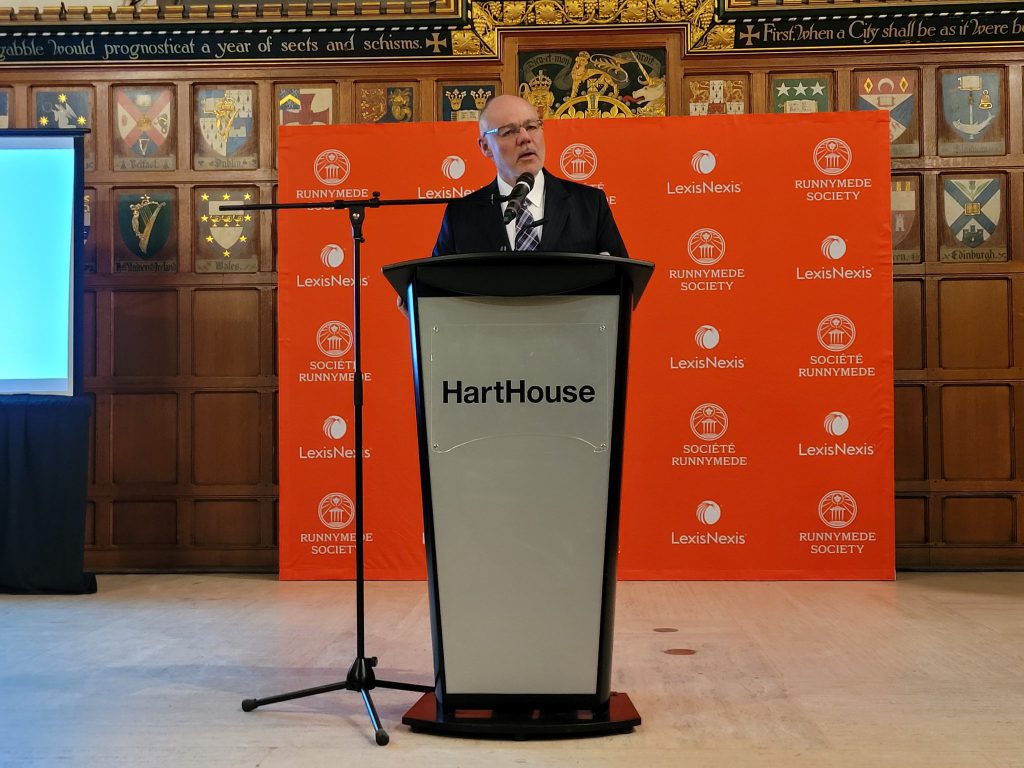
Supreme Court of Canada Justice Russell Brown closes January 2023 Runnymede conference, just days before reported drunken brawl after his creepy unwanted touching of mother and daughter in bar in USA. From March 15, 2023 Globe and Mail article:
“Bowmaster told (Officer Balcom in a recorded interview) Justice Brown kissed her daughter on the cheek or neck while at the same time making sexual advances on her, the mother. ‘I felt like he was coming on to me while he was touching her – super creepy’.”
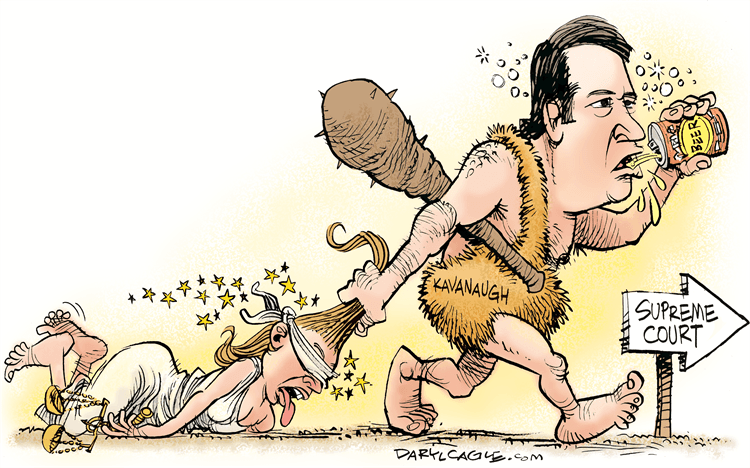
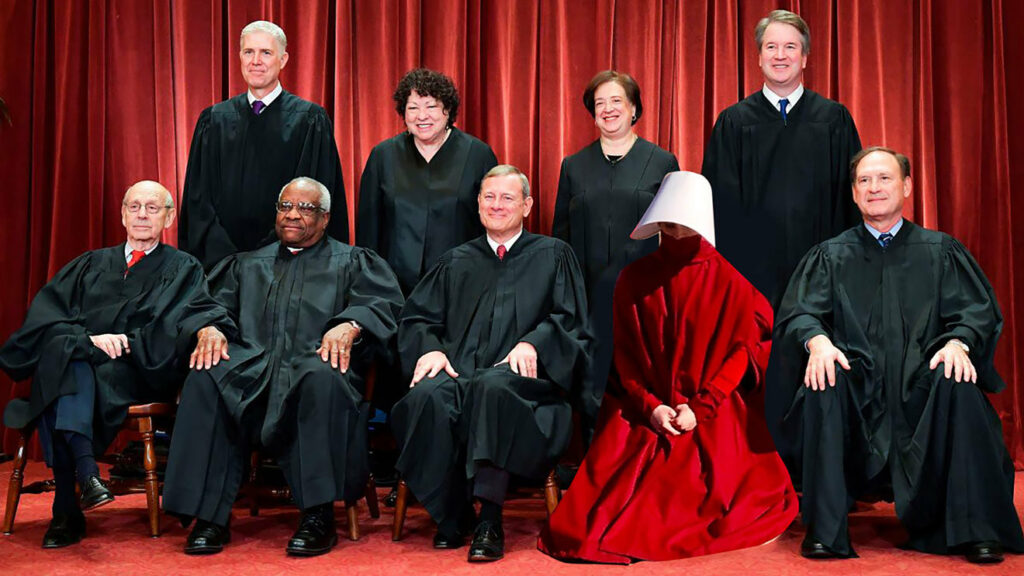
Didn’t realize we have unknown, possibly foreign $$$ influencing Cdn law studies with a specific intention to bend our society to a libertarian point of view. How is this not better known outside law schools? I want to know if anyone involved were to be considered for the bench.
![]() Secrets are a lawyer’s/judge’s/politician’s best friend. Steve Harper’s last quick sneak appointee onto our supreme court is an ultra creepy libertarian. J Brown was (and might secretly still be) involved in Calgary’s super ugly Justice Centre for Constitutional Freedoms (that fights for freedoms and rights for extreme conservatives while tramping on the rights of the rest of us) that helped/is helping organizers of the violent mob of insurrection fucker truckers that illegally held Ottawa under siege for weeks (fundraising by white supremacist Tamara Lich, founder of the heinous Maverick Party in Alberta), and demanded to over throw our democratically elected gov’t. Harper appointed 7/9 of the Supreme Court judges that heard my case and used it and my suffering to piss on our Charter of Rights and Freedoms (Harper hates our Charter). Canadians will be enduring libertarian rot on the court for decades thanks to Harper). I believe Brown was picked for his questionable extreme views, but also because he’s young and will thus be on the top court for decades to come eating away at our rights and environmental protections and to turn Canadian women into forced baby incubators for religious white supremacists.
Secrets are a lawyer’s/judge’s/politician’s best friend. Steve Harper’s last quick sneak appointee onto our supreme court is an ultra creepy libertarian. J Brown was (and might secretly still be) involved in Calgary’s super ugly Justice Centre for Constitutional Freedoms (that fights for freedoms and rights for extreme conservatives while tramping on the rights of the rest of us) that helped/is helping organizers of the violent mob of insurrection fucker truckers that illegally held Ottawa under siege for weeks (fundraising by white supremacist Tamara Lich, founder of the heinous Maverick Party in Alberta), and demanded to over throw our democratically elected gov’t. Harper appointed 7/9 of the Supreme Court judges that heard my case and used it and my suffering to piss on our Charter of Rights and Freedoms (Harper hates our Charter). Canadians will be enduring libertarian rot on the court for decades thanks to Harper). I believe Brown was picked for his questionable extreme views, but also because he’s young and will thus be on the top court for decades to come eating away at our rights and environmental protections and to turn Canadian women into forced baby incubators for religious white supremacists.![]()
… He is a literalist, a libertarian and a conservative. These match the legal and political values of the prime minister whose judicial nominating power is being used to establish judicial conservatism. Both Justice Brown’s views and the prime minister’s nominations can be seen as a normal and legitimate course for democratic will. In my view, this form of constitutionalism adopts unsound legal theory, lacks liberality of interpretation and defeats the idea of a common good.
… Justice Brown is the fourth Alberta jurist on the Court since there has last been a judge from Saskatchewan. Even if the next appointee to the Court were from Saskatchewan, the period of non-representation from that province would be two-thirds of a century. By long practice, membership on the Supreme Court has been based on a pattern of rotation in order to promote the national legitimacy of the Court; the prime minister has overridden this vital practice in order to promote his political ideology.
Second, political constraint was violated when the appointment was made right before an election. Although Justice Marshall Rothstein’s early retirement made possible the timing of this appointment, who could believe there is any legitimacy in appointing a new judge to the Supreme Court — the constitutional structure for preserving government under law — on the eve of a national election, just as prime ministerial appointing powers expire and as Parliamentary oversight evaporates?
Third, while attacks on political parties and policies, and on legal decisions, are open to virtually anyone, such partisanship in judges violates judicial ethics. For two and a half years before he was named to the Supreme Court, Justice Brown was a member of Alberta’s superior court and, then, its appeal court, and was obliged to preserve his neutrality on questions of law and politics.
The timing of his blogged rants against decisions, judges and lawyers is not clear — they have disappeared from the Internet — one hopes and assumes this practice stopped at the time of his initial judicial appointment.
However, his role as adviser to the Justice Centre for Constitutional Freedoms, an organization that advances conservative positions that often are inconsistent with the terms of the constitution and with decided cases, continued all the time that he was a judge in Alberta’s courts. While promotion by a judge of constitutional positions that are contrary to the Charter’s terms, and to judicial decisions made under it, is not a clear indication of how cases would be decided, suspicions of predisposition and questions of judicial decorum most certainly arise.
This appointment advanced the politicization of Canada’s judiciary and it erodes confidence in the Supreme Court’s neutrality. …
***
Andrew Bernstein@AndrewBernstei9 Replying to @rjmjanes:
The courts won’t save us. We have to save ourselves. The problem is that SCOTUS is not only “not saving” it’s actively getting in the way of Americans saving themselves.
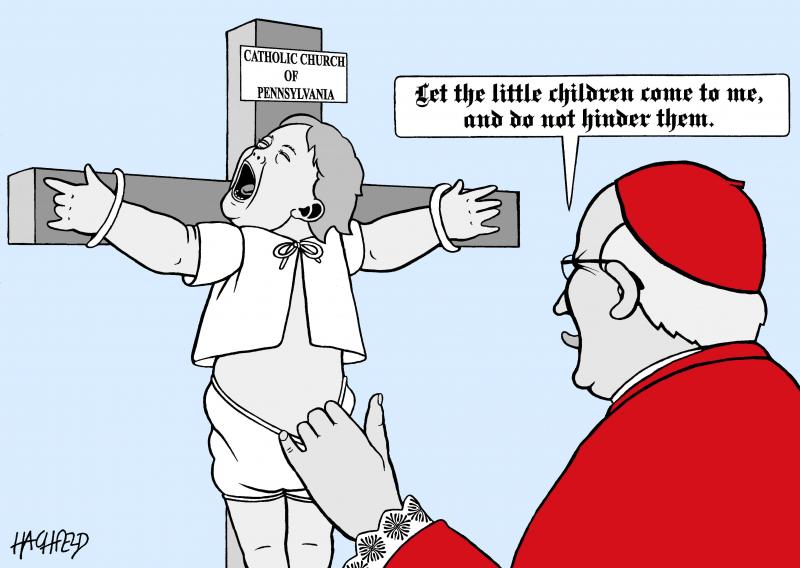
***
***
***
***
LaToya Baldwin Clark | DrMamaEsq@DrMamaEsq:
There is no way I would be ki-ki-ing with fellow members of the Court knowing they are systematically destroying democratic institutions and the so-called “rule of law.” Nah, me and Ginni’s husband couldn’t be friends.
***
The New Yorker: Supreme Court Tries to Overrule the Climate
Credit where due: the Supreme Court’s 6–3 ruling in West Virginia v. E.P.A. is the culmination of a five-decade effort to make sure that the federal government won’t threaten the business status quo. Lewis Powell’s famous memo, written in 1971, before he joined the Supreme Court—between the enactment of a strong Clean Air Act and a strong Clean Water Act, each with huge popular support—called on “businessmen” to stand up to the tide of voices “from the college campus, the pulpit, the media, the intellectual and literary journals, the arts and sciences, and from politicians” calling for progressive change. He outlined a plan for slowly rebuilding the power of industrial élites, almost all the elements of which were taken up by conservative movements over subsequent years: monitoring textbooks and TV stations, attacking left-wing faculty at universities, even building a publishing industry. (“The news stands—at airports, drugstores, and elsewhere—are filled with paperback and pamphlets advocating everything from revolution to erotic free love. One finds almost no attractive, well-written paperbacks or pamphlets on ‘our side,’ ” Powell wrote, but he was able to imagine a day when the likes of Ann Coulter or Sean Hannity would reliably top the best-seller lists.)
The View From Steeltown@TVFSteeltown Replying to @meaganmday:
Precisely. This decision affects not only the United States but the entire planet. This is an irresponsible decision with irreparable consequences. The USA has a responsibility to reign in its rogue court.
The Supreme Court holds that the Clean Air Act does not allow the EPA to impose a cap and trade structure on carbon emissions.
Supreme Court Rejects Broad EPA Authority to Regulate Greenhouse Gases from Power Plants (Updated)
The decision is an important one. It [holds the] EPA does not have broad, free-ranging authority to address climate change under the Clean Air Act. (This is also a warning for other federal agencies.)
Supreme Court: EPA Can’t Cap Greenhouse Gas Emissions From Power Plants
This is a narrower ruling, but may rule out some of the more aggressive steps the Biden administration might have considered to reduce sector-wide greenhouse gas emissions in areas such as utilities, refineries, and oil and gas development.
***
The media often says “in a blow to environmentalists” as if we’re the only ones who live on Planet Earth.
In a blow to humanity
Whenever I read “environmentalists” in the corporate media I always replace that word with “people who like to breathe.”
people that don’t need to make a profit out of everything.
***

Refer also to:
2006: Water usage advisory issued for Rosebud
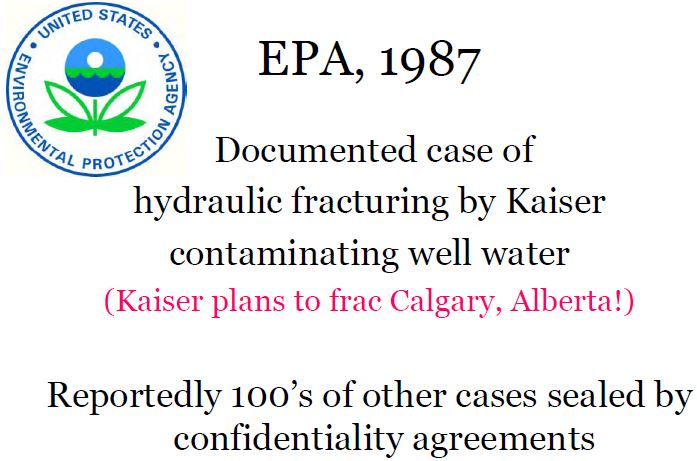
2012: Link Between Low Birth Weight and Fracking, Says New Research
2012: Unconventional Natural Gas Development and Infant Health: Evidence from Pennsylvania
2012: New Study Predicts Frack Fluids Can Migrate to Aquifers Within Years
2013: Elaine Hill: The Impact of Oil and Gas Extraction on Infant Health in Colorado
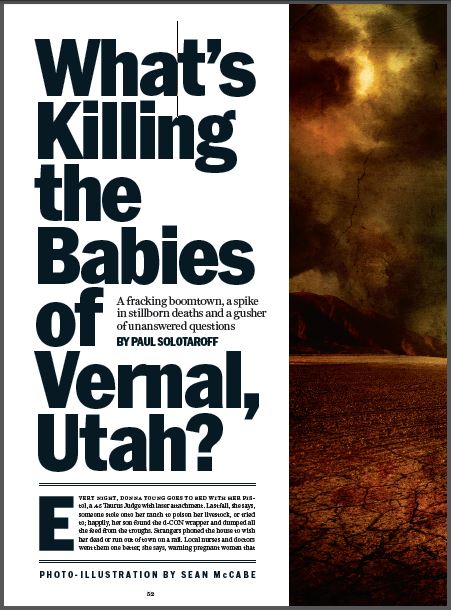
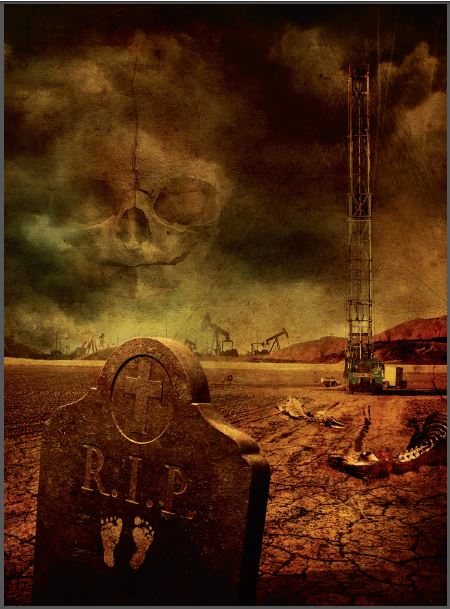


2014: Benzene Exposure Near the US Permissible Limit Is Associated With Sperm Aneuploidy
2014: 89-34 vote! New York Assembly passes fracking ban
2015: Fracing’s long reach: New Study says Fracking Wells Could Pollute The Air Hundreds Of Miles Away

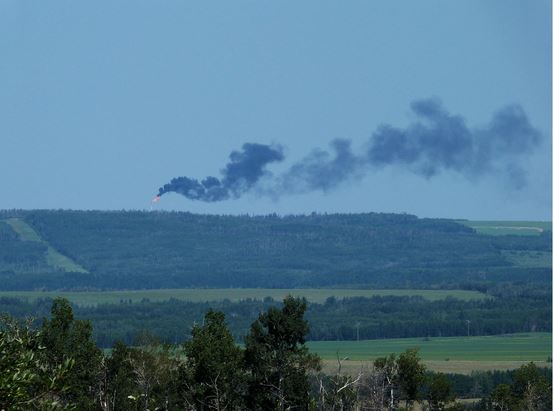
2015: Why Did New York State Ban Fracking? Massive study finds health, safety and environmental uncertainties regarding fracking’s dangers have ‘grown worse over time’ How soon before the supremely catholic court of the USA overturns state-legislated frac bans, contradicting their 2022 ruling saying only states can ban abortion which contradicts their 2022 ruling striking down New York State’s open carry gun ban.
The share prices of firearms manufacturers rose on Wall Street, with Smith & Wesson climbing more than 9 percent.
2017: New Study Says Fracking Negatively Impacts Infant Health
2019: Another new study: Fracking Activities May Contribute to Anxiety and Depression During Pregnancy
2019: How prevalent is racism (and misogyny) among Canadian lawyers & judges?
2021: Oh Order of Caveman Canada: Best comment of the last two frac’d decades!
Morgan got the Order of Canada for fracking your aquifer.
Comment by a Canadian living in Manitoba in response to this post: A murder mystery: Who really killed Encana? Or is this a Gwyn Morgan Puff Piece? Best thing that could happen is the death of AEC/Encana/Cenovus/Ovintiv
***
Walking Eagle News@TheEagleist June 29 2022:
Nation’s assholes say ‘just coincidence’ US Supreme Court ruling in favor of right-wing wet dreams lately, nothing to do with politics

